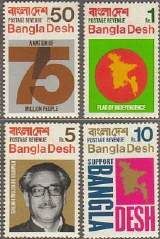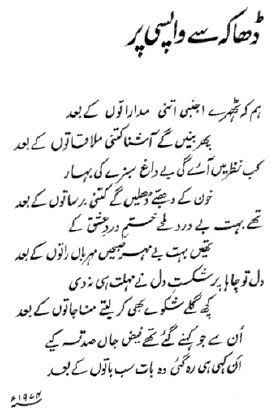Adil Najam
 As the fourth part of our series on the events of 1971, we are reposting this post which was first published at ATP on December 16, 2006. We are reposting it with all the original comments since they, as a whole, are very much part of the conversation we all need to have with ourselves. The previous three parts of the series can be read here, here and here.
As the fourth part of our series on the events of 1971, we are reposting this post which was first published at ATP on December 16, 2006. We are reposting it with all the original comments since they, as a whole, are very much part of the conversation we all need to have with ourselves. The previous three parts of the series can be read here, here and here.
Today is December 16.
Today Bangladesh will mark its 35th ‘Victory Day.’
 Most Pakistanis will go about their lives, not remembering or not wanting to remember. We should remember – and learn – from the significance of this date.
Most Pakistanis will go about their lives, not remembering or not wanting to remember. We should remember – and learn – from the significance of this date.
Not because it marks a ‘defeat’ but because it marks the end of a dream, 24 years of mistakes, horrible bloodshed, traumatic agony, and shameful atrocities. The constructed mythologies of what happened, why, and who is to be blamed need to be questioned. Tough questions have to be asked. And unpleasant answers have to be braced for. We need to honestly confront our own history, for our own sake.
But right now, the goal of this post is different. We at ATP just wish to extend a hand of friendship to our Bangladeshi friends. May the memories we make in our future be very different (and more pleasant) than the scars we carry from our past.
There is much – too much – that I wish to say; but cannot find words for. So let me do what I always do when I am at a loss of words. Let me quote Faiz Ahmad Faiz, who in his memorable 1974 poem ‘Dhaka say wapsi par’ (On Return from Dhaka) expressed what I wish to say so much better than I ever could.
We share with you here the original poem in Urdu, a version in ‘Roman Urdu,’ a wonderful English translation of the poem by the late Agha Shahid Ali in his book The Rebel’s Silhouette, and a video of Nayarra Noor singing the verses with the passion and feeling that they deserve.
ham ke Thehre ajnabi itni mulaaqaatoN ke baad
phir baneiN ge aashna kitni madaaraatoN ke baadkab nazar meiN aaye gi be daaGh sabze ki bahaar
khoon ke dhabe dhuleiN ge kitni barsaatoN ke baadthe bahut bedard lamhe khat’m-e-dard-e-ishq ke
theiN bahut bemeh’r subheiN meh’rbaaN raatoN ke baaddil to chaaha par shikast-e-dil ne moh’lat hi na di
kuchh gile shikwe bhi kar lete manaajaatoN ke baadun se jo kehne gaye the “Faiz” jaaN sadqe kiye
an kahi hi reh gayi woh baat sab baatoN ke baad
Agha Shahid Ali’s Translation:
After those many encounters, that easy intimacy,
. we are strangers now —
After how many meetings will we be that close again?When will we again see a spring of unstained green?
After how many monsoons will the blood be washed
. from the branches?So relentless was the end of love, so heartless —
After the nights of tenderness, the dawns were pitiless,
. so pitiless.And so crushed was the heart that though it wished
. it found no chance —
after the entreaties, after the despair — for us to
. quarrel once again as old friends.Faiz, what you’d gone to say, ready to offer everything,
. even your life —
those healing words remained unspoken after all else had
. been said.





















































Great post and many interesting comments. I agree with FH Malik’s comments. The fall of Dhaka can be given any name or theory but the bottom line is that it was the result of failure on the part of West and East Pakistanis to stick to Islamic brotherhood beliefs and put everything else second…to put Islam before and above ethnicity, etc.
I hope one lesson the different ethnicities of Pakistani Muslims learn from all this is that whenever India or any other enemy is interested in supporting a cause of an ethnic group (Baluchis, Muhajirs, Sindhis, etc.), it should be a clear sign that that cause is hurtful to Muslims of Pakistan and will only result in damaging the unity of Muslims in sub-continent even more and result in painful atrocities and memories. In case of East Pakistan, when Bangladeshis celebrate Independence Day and India also celebrates that day with Victory Day then some alarms should go off. Did people really think that India had Bengalis’ best interest in mind? Of course not, they wanted to reduce the power of Pakistan and also create a much weaker state that they can toy with whenever they want, which has been the case of Bangladesh since 1971. Case in point (and there are many, many of them): India in past few years has started building a fence along the border with Bangladesh even though Bangladesh keeps objecting but India doesn’t give a hoot about it because they know Bangladesh can’t do much.
One more point…many people in their comments pointed out to the brutality of the Pakistani Army in East Pakistan and that’s all very true albeit a bit overblown. But, we shouldn’t forget what happened to people who supported “West Pakistan”. They suffered immensely in the hands of Mukti Bahini (Bengali gangs of Sheikh Mujib’s Awami League). I was born and raised in Karachi but my family had to make two migrations…one from India to East Pakistan and then from there to Karachi and the other one was much more painful than the first one. Migrating from India was more of a personal decision and a willing decision for the sake of Islam/Muslims but the other migration was just to get away (and just barely) from their own people, hence more painful. And, still many many Pakistanis, yes PAKISTANI Muslims are to this day stranded in Bangladesh. The Bangladesh government doesn’t recognize them and the subsequent governments of Pakistan since ’71 have been extremely insensitive and compassion-less to bring them home. A whole generation has lost its identity, a whole generation has been born in a no man’s land, a whole generation has been decimated. MQM tried to raise the issue but MQM was so notorious (and rightly so) in Pakistan outside of Karachi/Hyderabad that people thought it was just another political issue.
This is the subject which drives a knfe into my heart and the knife cuts deeper as I find out more details about. Its sooo wrong on so many levels..
Indians feeling guilty for partition 1947, pakistanis feeling guilty for 1971, bbcurdu.com has pages full of details of atrocities killings and rapes committed by Brave Pakistani Army during military operation, one Srilankan Author Wrote a very hurtful comment in his memoirs ” the Total number of pakistani army in military operation was 100,000 and 300,000 was the number of teenage girls raped in East Pakistan during the war”
no comment
A good and necessary step towards provincial autonomy. More needed.
Intresting thing is that I didn’t find much articles on both eng and urdu news paper about dhakka fall. how come ayaz amir and nazir naji who were front men in hudood ordinance issue were unable to produce anything against military? is this due to their own background or just they are unable to say anything against military regime? I think most of them follow the approach of “Charhtey Sooraj k Poojari”.
i think everyone in Pakistan and Bangladesh would have some memory or other of the war back in 1971. However, times change, people move on and the scars do fill up…but can you go back to the way things were…Never…this is a sad truth about life…i once read a quote it went something like this ” A Relationship once broken may be mended but the scar will never go away”…so all we can hope for is that we might in the future nurture the hope of better economic ties and mutual agreements to improve trade and take advantage of the plus points of each country to enhance the economy in that region.